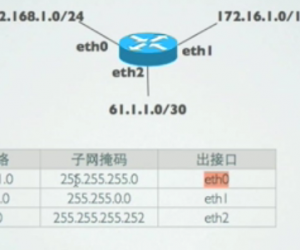shell运维自动化if-read
发布时间:2014-09-05 14:23:35作者:知识屋
shell运维自动化if-read
今天的课程中我们将学习对用户输出的参数进行判断。
例子:如果你说别人坏话?那就要挨打了。
故事2:
当你吃零食时,猫儿在你身边叫的时候,你听到了,然后你将手中的零食,分了一块给小猫,小猫得到零食后,就离开你了。很显然这只猫是吃贷。
下面我们拆分这个故事,并实现它。放开那只猫让你来。
这个故事里,听,分,离开是关键字
主人公听到后,做出的反应是分一点给猫,然后猫得到后就走了
2、1 read
shell:
read 从命令行读取一行用户输入
根据编程来看用的最多的是:
read -p “你的描述” ppp
意思:
在命令行输出一个提示用户输入的等待,然后定义了变量叫ppp(名字随便取,好的习惯是,变量名要用意义,好比,西瓜为什么叫西瓜不叫土豆?因为这是常识)
然后用户输入后,将用户的输入读进变量ppp
我们接到了变量,然后就应该干嘛?对这变量使用之。
2.1.sh
#!/bin/sh
#code by scpman
#read
read -p "What's your Name: " name
echo "Hi," $name
echo "now Time : `date`"
在这个脚本中,我们提示用户输入名字,然后输出hi,用户输出的名字,并在脚本中输出了当前系统时间。
2、2 if
在2.1中,我们已经接到用户输入了,那你给猫一只狗,猫会吃吗?任何时候,我们都不相信用户的输入!猫有原则,给只狗就是不吃,只吃老鼠(主人公在吃的零食)
如果你给的是老鼠,猫就吃,否则,就不吃。
那就用if来了解这个事吧
语法:
if ....then...fi
如果给的是老鼠,就吃
if ...else....fi
如果给的不是老鼠,而是别的呢
If....elif...elif....else...fi
如果给的是老鼠,或者给饼干,给别的等
if也在一些固定的表达式用来判断一些问题:
列出一些:
条件表达式
文件表达式
if [ -f file ] 如果文件存在
if [ -d ... ] 如果目录存在
if [ -s file ] 如果文件存在且非空
if [ -r file ] 如果文件存在且可读
if [ -w file ] 如果文件存在且可写
if [ -x file ] 如果文件存在且可执行
整数变量表达式
if [ int1 -eq int2 ] 如果int1等于int2
if [ int1 -ne int2 ] 如果不等于
if [ int1 -ge int2 ] 如果>=
if [ int1 -gt int2 ] 如果>
if [ int1 -le int2 ] 如果<=
if [ int1 -lt int2 ] 如果<
字符串变量表达式
If [ $a = $b ] 如果string1等于string2
字符串允许使用赋值号做等号
if [ $string1 != $string2 ] 如果string1不等于string2
if [ -n $string ] 如果string 非空(非0),返回0(true)
if [ -z $string ] 如果string 为空
if [ $sting ] 如果string 非空,返回0 (和-n类似)
条件表达式引用变量要带$ ,并最好加” $变量名”(通过失败的经验得来的)
2.3 实例
1、如果给的是老鼠,猫就吃
思考:可能的情况:
A如果你只是挥了下手,什么都没给
B 如果你给的不是老鼠
C 如果你给了老鼠,却扔给了别人
#!/bin/sh
#code by scpman
#cat’s food
read -p “Please input the cat’s food:” food
if [ -n “$food” ]
then
echo $food
fi
要是有输入就输出,没有输入就退出,并提示用户什么都没输入。
如果得到了输入就进行判断,如果给的是老鼠就说谢谢,如果不是老鼠就不要,并提示用户
# vi 2.3.2.sh
#!/bin/sh
#code by scpman
#cat's food
read -p "Please input the cat's food: " food
if [ -n "$food" ]
then
echo the food:$food
else
echo You give cat a null
fi
if [ "$food" = 'laoshu' ]
then
echo 3Q,cat love laoshu
elif [ "$food" = 'pig' ]
then
echo sorry,cat not love pig
else
echo cat not like others!
Fi
# sh 2.3.2.sh
Please input the cat's food:
You give cat a null #这里为空应该提示完直接退出?
cat not like others! #这一句怎么也输出了?
Shell:
exit 脚本退出
# vi 2.3.3.sh
#!/bin/sh
#code by scpman
#cat's food
read -p "Please input the cat's food: " food
if [ -n "$food" ]
then
echo the food:$food
else
echo You give cat a null
exit ####看这里,#号代表注释,这样当条件走这时,就直接提示并退出 了
fi
if [ "$food" = 'laoshu' ]
then
echo 3Q,cat love laoshu
elif [ "$food" = 'pig' ]
then
echo sorry,cat not love pig
else
echo cat not like others!
Fi
# sh 2.3.3.sh
Please input the cat's food:
You give cat a null
这次就对了
# sh 2.3.3.sh
Please input the cat's food: pig
the food:pig
sorry,cat not love pig
scpman# sh 2.3.3.sh
Please input the cat's food: lkjdslfldsf
the food:lkjdslfldsf
cat not like others!
scpman# sh 2.3.3.sh
Please input the cat's food: laoshu
the food:laoshu
3Q,cat love laoshu
当然用不了,写这么多行,就能搞定,本书的所有例子,不要求有多少行,只要求思路清晰
希望大家少写NB的代码(只有自己想几次才看懂的代码!)
看到着,免得被大家骂,咱们赶紧来一个有用的例子吧!
2.4
小实例:
判断/usr/test目录在不在,如果不在就输出,然后建立这个目录
建立完这个目录后,读/etc/passwd文件,找出文件中所有用户并在/usr/test/下建立出各用户名字对应的文件
编程:先看懂你要做什么,然后喝口水,想好了思路再开始,一气呵成。
外行:好,这个需求简单,几分钟写完了,然后再看下要求,再重复来,键盘也是有尊严的
# vi 2.4.sh
#!/bin/sh
#code by scpman
#mkdir ,touch file
mulu="/usr/test"
if [ -d "$mulu" ]
then
echo $mulu is have
else
mkdir $mulu
echo $mulu create ok
fi
for username in `cat /etc/passwd |grep -v "^#" | awk -F':' '{print $1}'`
do
cd $mulu
touch $mulu/$username
done
ls -l $mulu
脚本中的for循环部分明天讲
# sh 2.4.sh
/usr/test create ok
total 0
-rw-r--r-- 1 root wheel 0 Jan 20 07:42 _dhcp
-rw-r--r-- 1 root wheel 0 Jan 20 07:42 _pflogd
-rw-r--r-- 1 root wheel 0 Jan 20 07:42 bin
-rw-r--r-- 1 root wheel 0 Jan 20 07:42 bind
-rw-r--r-- 1 root wheel 0 Jan 20 07:42 daemon
-rw-r--r-- 1 root wheel 0 Jan 20 07:42 games
-rw-r--r-- 1 root wheel 0 Jan 20 07:42 kmem
-rw-r--r-- 1 root wheel 0 Jan 20 07:42 mailnull
-rw-r--r-- 1 root wheel 0 Jan 20 07:42 man
-rw-r--r-- 1 root wheel 0 Jan 20 07:42 news
-rw-r--r-- 1 root wheel 0 Jan 20 07:42 nobody
-rw-r--r-- 1 root wheel 0 Jan 20 07:42 operator
-rw-r--r-- 1 root wheel 0 Jan 20 07:42 pop
-rw-r--r-- 1 root wheel 0 Jan 20 07:42 proxy
-rw-r--r-- 1 root wheel 0 Jan 20 07:42 root
-rw-r--r-- 1 root wheel 0 Jan 20 07:42 scpman
-rw-r--r-- 1 root wheel 0 Jan 20 07:42 smmsp
-rw-r--r-- 1 root wheel 0 Jan 20 07:42 sshd
-rw-r--r-- 1 root wheel 0 Jan 20 07:42 toor
-rw-r--r-- 1 root wheel 0 Jan 20 07:42 tty
-rw-r--r-- 1 root wheel 0 Jan 20 07:42 uucp
-rw-r--r-- 1 root wheel 0 Jan 20 07:42 www
(免责声明:文章内容如涉及作品内容、版权和其它问题,请及时与我们联系,我们将在第一时间删除内容,文章内容仅供参考)
相关知识
-

linux一键安装web环境全攻略 在linux系统中怎么一键安装web环境方法
-

Linux网络基本网络配置方法介绍 如何配置Linux系统的网络方法
-
Linux下DNS服务器搭建详解 Linux下搭建DNS服务器和配置文件
-
对Linux进行详细的性能监控的方法 Linux 系统性能监控命令详解
-
linux系统root密码忘了怎么办 linux忘记root密码后找回密码的方法
-
Linux基本命令有哪些 Linux系统常用操作命令有哪些
-
Linux必学的网络操作命令 linux网络操作相关命令汇总
-

linux系统从入侵到提权的详细过程 linux入侵提权服务器方法技巧
-

linux系统怎么用命令切换用户登录 Linux切换用户的命令是什么
-
在linux中添加普通新用户登录 如何在Linux中添加一个新的用户
软件推荐
更多 >-
1
 专为国人订制!Linux Deepin新版发布
专为国人订制!Linux Deepin新版发布2012-07-10
-
2
CentOS 6.3安装(详细图解教程)
-
3
Linux怎么查看网卡驱动?Linux下查看网卡的驱动程序
-
4
centos修改主机名命令
-
5
Ubuntu或UbuntuKyKin14.04Unity桌面风格与Gnome桌面风格的切换
-
6
FEDORA 17中设置TIGERVNC远程访问
-
7
StartOS 5.0相关介绍,新型的Linux系统!
-
8
解决vSphere Client登录linux版vCenter失败
-
9
LINUX最新提权 Exploits Linux Kernel <= 2.6.37
-
10
nginx在网站中的7层转发功能
























